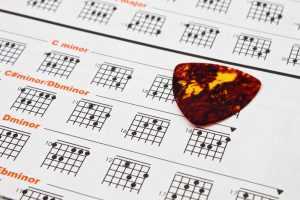
There is no way to learn how to play an instrument without sitting down and practicing over and over again. Duh, right? We’ve all heard this advice millions of times, but it doesn’t make learning how to play an instrument any easier. Whether you’re 8 years old or 80, life seems to always get in the way of our plans and aspirations. If you want to learn an instrument, how do you find the motivation to practice in a hectic world where all you probably want to do is relax in the few free moments you have? Finding inspiration to practice amidst the piles of sheet music isn’t easy, but there are things you can do to help you get there.
Planning
Students who carve out dedicated time to practice and play their instrument for fun are the ones who are most likely to stick with it and really make progress. If learning an instrument is one of your priorities, then you need to begin treating it like one. Schedule at least 3 times every week where you do nothing but practice. Obviously things happen, and you’ll probably find yourself missing a few practices here and there, but the trick is to not let a missed practice derail your intention of getting better with your instrument.
Play For Fun

I can’t stress enough how important it is to play for fun. Yes, dedicated practice is vital if you want to enhance your skills, learn to read music, or prepare for a performance, but playing without any plan or intention makes room for creativity and musical growth at the same time. Something I always do with my piano students is to dedicate the first 10 minutes of a lesson to improvisation, no matter what the student’s age or background is. Music is amazing because of its ability empower the musician and listener alike, and music educators seem to forget that sometimes. Yes, plan to practice, but making time to simply play your instrument for fun will keep you emotionally engaged, interested, and will help you find the motivation to practice in the future.
Make Goals
If learning an instrument is one of your priorities, then your practice and hard work should lead to tangible goals. Are you an aspiring songwriter? Then record a few demos and start looking up good open mic nights to play in your city. Have you been practicing Bach concertos on piano for years and you’re starting to feel burned out? Then challenge yourself by creating a goal that has to do with learning a new piece of music in a completely different style than you’re used to. You’ll never get to the point in music where you’ll say, “I’m good; I know everything now.” There’s always something new to learn and hear, and that’s sort of a comforting thought when you think about it. Whether you’re completely new to music or you’ve been playing for a lifetime, doing your best to stay actively curious about music and all its possibilities will help you find the motivation to practice.
Go See Live Music
Sometimes us musicians get so wrapped up in practicing and rehearsing, that we forget how important it is for us to go and experience live music. Seeing someone really, really good perform will change your whole perspective on what’s possible to do in music. Taking the time out of your busy week to see live music will keep you motivated, interested, and engaged. I also recommend seeing a style of music you’ve never seen. Don’t know much about the blues? Then look up a good blues bar and get down there. Have you ever wondered what it’d be like to check out the symphony? Then get off your butt and go experience something completely new. Embracing curiosity and the newness of things is vital for musicians who want to stay fresh and engaged with music.
Excuses, Excuses
Can I let you in on a little secret? Kids tend to be my best students. Kids always have their parents around to tell them to practice, but adults have no one but themselves to keep them accountable. Finding the motivation to practice an instrument is like so many other challenges adults face: sticking to a diet, exercising, and spending more time with the family are a few things that come to mind. Here’s what can happen when I teach adults who let excuses get in the way of their music lessons: I start teaching a super enthusiastic adult who has wanted to learn an instrument for years. After two weeks, excuses like, “I’m sorry, this week has been really crazy with work”, start to creep in. By the time the first month is over, a lot of adult students simply give up and stop playing their instrument. It doesn’t have to be like this!
Why do we think we have to quit just because we didn’t practice for a week or two? If you are new to learning an instrument, you have to start seeing things in the long term. Being busy and skipping practice for a week or two isn’t ideal, but it’s much better than quitting forever. It reminds me of people who try the whole New Year’s resolution thing. It’s great to set out with lofty goals and aspirations, but you will inevitably face challenges and fail sometimes. What you do with failure says everything about you and what you truly care about. Skipping a few practices is totally fine. Just remember to get back on track.
Getting Over the Hump
 Learning how to do anything new comes with a difficult introductory period where it can sometimes feel like you can’t do anything right. This is by far the toughest part of learning to play an instrument. Don’t give up! If it’s tough, it just means that you’re actually trying. What’s really happening during this period is that your brain is forging new connections to your muscles. Imagine slowly making your way through the jungle by slashing through all the vines and tree branches. This is called muscle memory, and you’ll need it to be able to function properly with an instrument. Thoughtful repetition is the only thing that makes muscle memory happen. This is why remembering to play scales and exercises is so important. Nothing I say is going to make the first few months of playing an instrument easier for you, but I do recommend trying to be as patient and optimistic as possible. You will see good results if you engage in thorough, dedicated practice a few times a week. You’ll see even better results if you practice more than that. Once you’ve gotten over the hump, your skills and talents will begin to develop, and you’ll be able to focus on what you want to accomplish with your instrument.
Learning how to do anything new comes with a difficult introductory period where it can sometimes feel like you can’t do anything right. This is by far the toughest part of learning to play an instrument. Don’t give up! If it’s tough, it just means that you’re actually trying. What’s really happening during this period is that your brain is forging new connections to your muscles. Imagine slowly making your way through the jungle by slashing through all the vines and tree branches. This is called muscle memory, and you’ll need it to be able to function properly with an instrument. Thoughtful repetition is the only thing that makes muscle memory happen. This is why remembering to play scales and exercises is so important. Nothing I say is going to make the first few months of playing an instrument easier for you, but I do recommend trying to be as patient and optimistic as possible. You will see good results if you engage in thorough, dedicated practice a few times a week. You’ll see even better results if you practice more than that. Once you’ve gotten over the hump, your skills and talents will begin to develop, and you’ll be able to focus on what you want to accomplish with your instrument.
Reign In Expectations
Let’s face it: even if you love music, practice can seem like a chore sometimes. And you know what? It’s totally ok to feel burned out with practice sometimes. Learning an instrument can be really tough work that you can commit to for years. Despite all the amazing advancements we’ve made with technology in recent decades, we’re still far away from a reality similar to the Matrix where we can just download skills and years of experience straight to our brains in an instant. Yes, if you want to do anything worthwhile in music, you’ve got to invest the time and the effort. But you also have to accept that you’re never going to be perfect. Falling short, messing up, and not getting what you want is inevitable in music and life. If you lead a life that’s purpose is to avoid mistakes and risk, you’ll probably just quit playing an instrument the minute you realize how hard it is. Coping with failure is an important part of learning. Failure is a motivating force that puts us in the right direction. Whether you’re a seasoned musician or someone totally new to music, it’s a good idea not to fear failure and risk.
Stay Hopeful
I sometimes teach students who are perpetually convinced that they’ll never get any better, no matter how hard they try. This, my friends, is called a self-fulfilling prophecy. If we set ourselves up  to believe that we can’t accomplish a goal, then we act in a way that prevents us from accomplishing our goal. It’s easier to sulk in the corner than to fail over and over again till you succeed. Doing your best stay actively hopeful will help you stay motivated to practice and accept where you are with your musicianship. It’s as simple as setting long term goals and never giving yourself permission to stop pursuing them.
to believe that we can’t accomplish a goal, then we act in a way that prevents us from accomplishing our goal. It’s easier to sulk in the corner than to fail over and over again till you succeed. Doing your best stay actively hopeful will help you stay motivated to practice and accept where you are with your musicianship. It’s as simple as setting long term goals and never giving yourself permission to stop pursuing them.
Record Your Progress
If you’re new to an instrument, I recommend recording one practice a month and monitoring your progress. Yes, embracing failure is important, but you’ve also got to celebrate successes in your musicianship, not matter how small. Listening back to your playing is good to do anyway because it shows you what you truly sound like and how you can improve. Software programs like Apple’s Garage Band are great for recording practice sessions in a quick and easy way.
Change Up Your Practice Routine

You might have trouble finding the motivation to practice if you do the same thing over and over again. Switching up your routine is a great way to add new life and energy into your practice. If you’ve been working on something for months and months but can’t seem to get it, I suggest taking a break and switching to something new for a while. Practice sessions should be hard, thoughtful work, but you shouldn’t dread them. If you find that things are getting stale, switch things up and start learning something new.
Practice with a Quality Instrument
If you have your heart set on learning how to play guitar, but the only instrument you can afford is one from Wal-Mart, then you have a challenging road ahead of you. In recent years, Wal-Mart, Best Buy, and Target have started to sell cheap guitars and keyboards that are nearly impossible to learn on. I’ve played guitar for 15 years and I can’t make a Wal-Mart guitar sound good, so chances are you won’t be able to either. If you’re serious about learning an instrument, buy a decent one to learn on. If you can’t afford to buy an instrument now, you can look into renting one from a music store or finding something used.
It’s also a good idea to make sure that your practice area is as comfortable as possible. If you’re learning to play guitar on a sunken in couch and without a music stand, you’re going to feel uncomfortable and distracted. Set up a clean, comfortable area to practice in. Do everything you can to set yourself up for success in your practices.
Practice with Experts
Practicing music with people better than you is a great way to improve and get inspired. When we practice music alone, it’s easy to adopt an isolated view about practice, but playing with seasoned experts can give you good ideas and get you out of a rut. It’s always good to ask questions. This is how you can find out how someone got as skilled as they are. Get involved with a community of musicians and take every opportunity you can to see your friends play live. It’s also a good idea for you to play what you’re learning in practice in front of an audience; even if it’s just a friend or two.
At The End of The Day
Learning to play an instrument isn’t for everyone, and that’s ok. Becoming a real musician is hard, intense work that lasts for years. If you’ve never been able to get excited about playing music, then musicianship probably isn’t an area of your life you should keep investing time and effort in. But there’s a world of difference between someone interested in music who feels discouraged or bored sometimes from a person who can’t seem to get interested in music at all. If you’re the former, I encourage you to embrace curiosity and take risks with your practice. There’s no one way to go about finding the motivation to practice your instrument, but learning to hear music in a new way is a good start.









Hey Patrick, this is a great article. I’ve been reading and researching a lot about motivation and inspiration to practice over the last couple of years and a lot of your advice is exactly what people need to get their hands itching to pick up an instrument.
Motivation to practice is something that we are trying to target with PitchPlay. The site is a practice tool and social network for musicians. You should check out the site – I’d love to hear your opinion and perhaps if you find it useful, you could even include a link to the site in your blog as a helpful practice tool.
Thanks,
Hayley